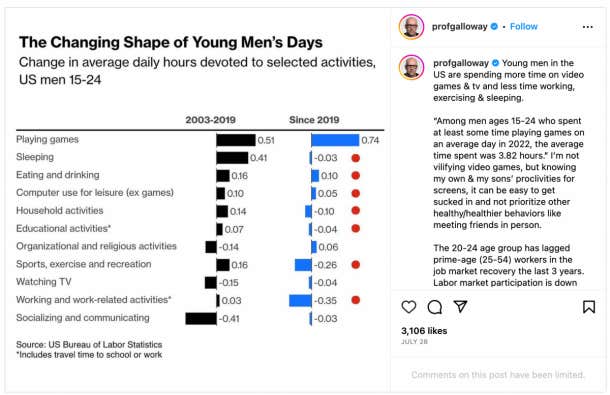Stop Blaming Women For Adult Men’s Loneliness
I’m going to keep this short. OK, not short, but as short as I can when considering all the related intersections.
Many professors and high-level thinkers of all political persuasions talk about how lonely men are. A few are even pointing out how dangerous lonely men can be.
They’re not wrong, and the crisis of male mental health is an indispensable subject, which is especially true if you’re raising boys.
Even if you aren’t in a parental role, we can agree that men deserve an emotionally satisfying life. Everyone does. Society has damaged men and boys by confining their emotional experiences through shame and violence. Addiction rates and rates of death by suicide or accidental overdose are shockingly high among boys and men, and it’s genuinely disturbing.
Yet, social media continues to comment on how hard it is for some men to meet women on dating apps and the role this plays in the male mental health crisis. The framing of these clips implies that not having access to the women they want to date is traumatizing men and is the primary contributor to male loneliness.
Scott Galloway cites a stat wherein men have to swipe 1000 times on dating apps to end up with one in-person coffee date.
I’m not saying his data is wrong (though I haven’t seen it with my eyes). I’m saying the recent emphasis on women’s rejection (or the appearance of rejection) as one of the root problems of this crisis is dangerous. It’s a lie.
Here’s why we must stop blaming women for adult men’s loneliness.
1. The myth breeds frustration & anger against women
The male loneliness problem exists because men have taught boys and other men to push intimate and meaningful friendships away. This has been happening for generations.
Homophobia and bizarre-o mainstream standards of masculinity prevent cis-het men from having an intimate circle of friends — men or women — who support them. So, they don’t have guys who boost them up, who show up for them when times are hard, who come over to hang out on a lonely Friday after a breakup, or when they’ve lost a job. And that is painful.
There are exceptions to this, of course. Men in recovery programs often form deep, powerful bonds with one another. My friend Tom, sober for decades, says in many ways he’s lucky he was addicted because it gave him the opportunity to form friendships with men who show up for him. Recovery programs gave him a framework that had opportunities to show up for other men.
Tragically, most men haven’t been encouraged to do this, and they pass the tradition of masculine isolation on to their sons.
2. Enforced male isolation actively harms women, too
For generations, American men have been told their wives and girlfriends should be their sole source of emotional support and intimacy. Maybe not overtly, with actual words, but they get the message. For men in the USA, talking to a buddy about your deep fears, core wounds, traumas, and disappointments is not manly. For many generations, it was inconceivable.
And do you know what that means on a practical level?
That means women are not just cis-het men’s life partners and the mothers of their children. We are their only real emotionally present friends, their therapists, their 911 emergency service operators during crises, their career counsellors, their workplace relationship advisors, and even their drug and alcohol counsellors (until they get into recovery) if they’re misusing substances.
Women are all of that, on top of being personal shoppers, housekeepers, personal assistants, laundresses, sexy fantasy women, and night nurses for their children whom we likely gave birth to, among many other things.
Obviously, not all men or relationships are like this. Many men also give richly to their wives and girlfriends and offer the same level of service in return: friendship, laundry, personal chef-ery, warm shoulders to cry into when times get tough, and even the occasional foot massage. Those of us with good husbands and boyfriends are grateful.
But, the difference in how men’s emotional needs are met in a relationship is still vastly different from women’s.
Women probably have at least one non-romantic friend they can call when they need to have a deep, emotional talk or when they need intimate advice.
A post shared by @profgalloway
When I see meme after meme, interview after interview, intelligent men and some women who are experts in the subject say, “Men are lonely, and the high standards of successful women are the problem!” I am enraged.
3. This is not a ‘women problem’
It may be a tech problem, it may be a modern society problem, it may be a masculinity problem, it may be a parenting problem, it may be an economic problem, it may even be a problem with modern education — and I think it is probably all of them.
But it is not a women problem.





Perhaps if men dated someone THEIR OWN AGE, INSTEAD OF PURSING SOMEONE MUCH, MUCH YOUNGER AND CONSIDERABLY HOTTER THAN THEMSELVES, it wouldn’t take a thousand bloody swipes to meet up on that “coffee date.” Having ridiculously unrealistic expectations is just one of the many cons of entitlement.
And since men commit the vast majority of murders, it would only make sense that they commit the vast majority of suicides.